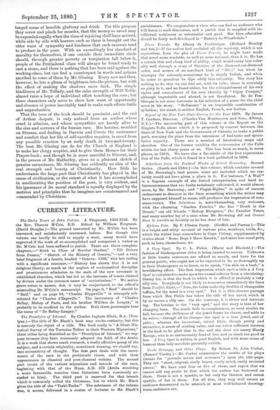A Very Opal. By C. L. Pirkis. (Hurst and Blackett.)—The
fashion of Shakespearean titles is being carried to excess. Unknown or little known sentences aro affixed to novels, and have for the general public, who ought not to be expected to be so thoroughly up in their Shakespeare as to know, so to speak, " his skin on a bush," a bewildering effect. The first impression which such a title a A Very Opal is calculated to make upon the casual selector from a circulating- library list, is that the book to which it is affixed is probably a very silly one. Everybody is not likely to remember immediately the lines from Twelfth Night,—" Now, the tailor make thy doublet of changeable taffeta, for thy mind is a very opal." Yet it is this obscure passage from which Mrs. Pirkis has taken the title of her novel, which is by no means a silly one. On the contrary, it is clover and interest-
ing. The heroine is the "very opal," and the story is that of her changing hues. The simile fails in completeness, as most similes do fail, because the shiftiness of the jewel forms its charm, and adds to its value,—through all its changes the opal is a true jewel, and of price ; whereas the inconstant, trivial Elsie, though pretty and
attractive, is never of sterling value, and one takes sufficient interest in the book to be glad that in the end she does not marry Hardy Kempe, who is so unreasonably fond of her, and so much too good to her. A Very Opal is written in good English, and with more sense of humour than lady-novelists generally exhibit.


































 Previous page
Previous page